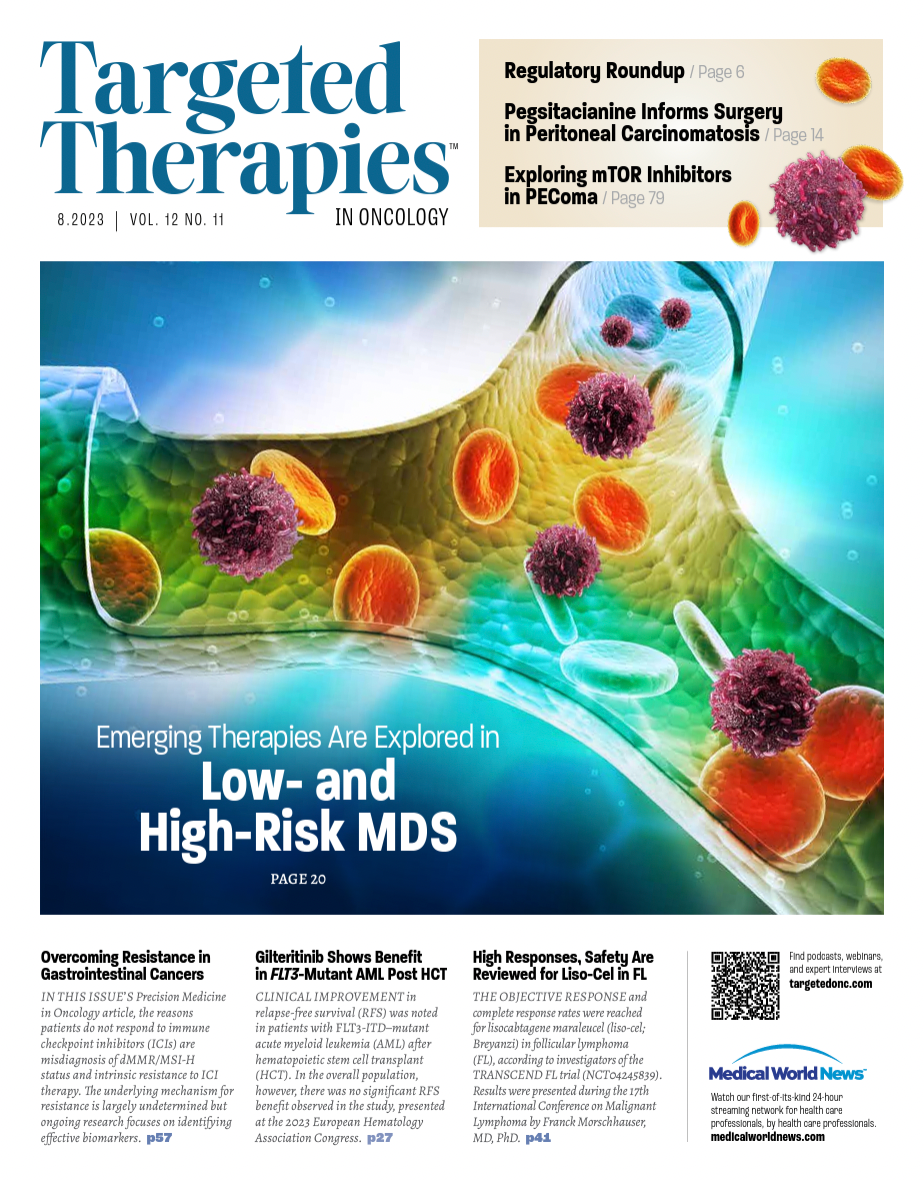Ibrutinib Combo Shows Improved Duration of Response in rFL/MZL
The combination of ibrutinib with chemoimmunotherapy improved the duration of response for a subset of patients with relapsed follicular lymphoma and marginal zone lymphoma.

When combined with ibrutinib (Imbruvica), chemoimmunotherapy showed improved duration of response for a yet undefined subset of patients with relapsed follicular lymphoma (rFL) and marginal zone lymphoma (MZL), Loretta J. Nastoupil, MD, said in a presentation at the 17th International Conference on Malignant Lymphoma in Lugano, Switzerland. Nastoupil is associate professor and deputy chair, and director, Lymphoma Outcomes Database, Department of Lymphoma/Myeloma, Division of Cancer Medicine, The University of Texas MD Anderson Cancer Center in Houston.
Although the phase 3 SELENE study (NCT01974440) yielded insignificant improvement in progression-free survival (PFS), findings demonstrated single-agent activity in patients with MZL. Patients with MZL in the experimental arm who received ibrutinib plus chemoimmunotherapy (bendamustine [Bendeka] and rituximab [Rituxan] [BR]; or rituximab, cyclophosphamide, doxorubicin, vincristine, and prednisone [R-CHOP] showed a longer response duration of 44.3 months (95% CI, 32.9-60.0). This was contrasted with the control arm which was 21.7 months (95% CI, 17.6-32.4) with MZL patients receiving BR or R-CHOP plus placebo.1
“There are lessons to be learned from this study,” Nastoupil said, who is also section chief, Indolent Lymphoma, New Drug Development at MD Anderson Cancer Center. “The efficacy observed with chemoimmunotherapy in relapsed follicular marginal zone lymphoma was quite striking… There is likely a subgroup of patients within lymphoma who do derive clinical benefit from a targeted agent such as a BTK [Bruton tyrosine kinase] inhibitor, but we have failed to identify a biomarker or a clinical subgroup to identify who those patients are.”1
When exploring subgroups, a specific subgroup consisting of 56 patients with MZL, the PFS was consistant in both arms. The overall response rate was 91.6% in the ibrutinib containing arm and 90.5% in the placebo containing arm, and the complete response rate was 55.0% and 50.2%, respectively.1 At the 84 month evaluation, investigators reported overall survival (OS) to be similar in both arms with 7-year estimates. The treatment arm was 67.4% vs 68.3% for the placebo arm.
Typically treated with chemotherapy, patients with rFL and MZL have witnessed a shorter remission. Introducing novel, well-tolerated therapies is needed to enhance remission duration. The study aimed to achieve a hazard ratio of 0.7, corresponding to an 8.6 month increase in PFS, with at least 80% power and a 5% significance level Nastoupil explained.

SELENE was a randomized, double-blind, placebo-controlled trial containing 2 arms evaluating BR or R-CHOP chemotherapy plus ibrutinib in the experimental arm and chemotherapy alone with placebo in the control arm. Patients were randomly assigned 1:1 and were treated for 6 cycles of BR or R-CHOP, which was administered simultaneously with 560 mg of ibrutinib daily or placebo. A total of 403 enrolled patients, but 3 patients withdrew from the trial; 2 by consent and 1, by investigator decision. Among the remaining patients, 201 received ibrutinib and 199 placebo, along with chemoimmunotherapy; 36 patients were ongoing in the ibrutinib arm and 35 in the placebo arm at the time of the final analysis.1 For patients to qualify they needed an ECOG performance status of 0 or 1 and at least 1 prior line of therapy (including chemotherapy backbone in combination with a CD20 monoclonal antibody). The 2 arms were balanced with patients at a median age of 59 years; 86.1% had FL and 13.9% had MZL across both groups. More than half of patients (50.2% in the experimental arm and 58.7% in the control arm) reached progression of disease status within 2 years, and two-thirds (65.0%) had prior anthracycline-based therapy in both arms. Overall, the median prior lines of therapy was 1 (range, 1-9).1
In the experimental arm, 30.8% of patients experienced treatment-emergent adverse events (TEAEs) (grade 3 or higher with some resulting in drug reduction or discontinuation) vs 18.6% in the control arm.1 Special interest AEs included 6 hemorrhage events in the ibrutinib-containing arm vs 2 in the placebo arm; atrial fibrillation rates of 6.5% vs 2%, respectively; and hypertension (9.5% for both groups). The most common AEs, grade 3 or higher, were cytopenia and diarrhea. Less common AEs, grade 3 or higher, were anemia and thrombocytopenia (specific to the ibrutinib arm) and neutropenia, which was consistent between the 2 arms.1
“Although the ibrutinib plus chemotherapy did not report significant PFS results for patients with rFL, surprisingly, efficacy for patients with MZL was robust in both arms, although the duration of response was improved in the ibrutinib-containing arm,” Nastoupil explained. “Adding a targeted agent to an effective regimen may not be a successful strategy moving forward, as there was no separation in those PFS curves [between the 2 arms] in the first 12 to 18 months.”1 Going forward, further research is needed to identify biomarkers or clinical subgroups to identify these patients, she added.
REFERENCE
1. Nastoupil, LJ, Hess G, Pavlovsky MA, et al. Ibrutinib plus BR or R-CHOP in previously treated patients with follicular or marginal zone lymphoma: the phase 3 SELENE study. Presented at: 17th International Conference on Malignant Lymphoma; June 13-17, 2023; Lugano, Switzerland. Accessed July 6, 2023. https://onlinelibrary.wiley.com/doi/full/10.1002/hon.3196_LBA2

Survivorship Care Promotes Evidence-Based Approaches for Quality of Life and Beyond
March 21st 2025Frank J. Penedo, PhD, explains the challenges of survivorship care for patients with cancer and how he implements programs to support patients’ emotional, physical, and practical needs.
Read More
Examining the Non-Hodgkin Lymphoma Treatment Paradigm
July 15th 2022In season 3, episode 6 of Targeted Talks, Yazan Samhouri, MD, discusses the exciting new agents for the treatment of non-Hodgkin lymphoma, the clinical trials that support their use, and hopes for the future of treatment.
Listen